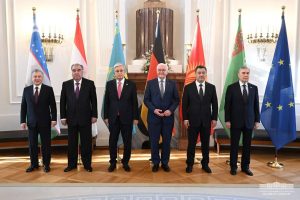On the heels of their first ever summit with the U.S. president, Central Asia’s leaders touched down in Berlin last week for a summit hosted by German Chancellor Olaf Scholz. The war in Ukraine (and the end of the war in Afghanistan) has fed a widespread recalibration of relations between not just the United States and Central Asia but also Europe and the region.
Among EU countries, Germany is one of Central Asia’s most significant partners, elevating the importance of the summit. In an article for The Diplomat, Rustam Kayumov, head of the Center for European Studies of the Institute for Advanced International Studies (IAIS) and the University of World Economy and Diplomacy in Tashkent, Uzbekistan, wrote that “[i]n general, Germany sets the direction of Central Asia policy for the EU.”
The summit in Berlin was attended by Kazakh President Kassym-Jomart Tokayev, Kyrgyz President Sadyr Japarov, Tajik President Emomali Rahmon, and Uzbek President Shavkat Mirziyoyev. In place of the Turkmen president, Serdar Berdymuhamedov, his father Gurbanguly Berdimuhamedov – current chairman of the People’s Council and a former president himself – attended the Germany summit instead.
The joint statement produced from the summit is wide-ranging and culminated with an agreement to establish a “Strategic Regional Partnership” between Germany and Central Asia. Within this framework, the two sides would “consolidate and upgrade the existing cooperation” among them under four areas: economy, energy, and natural resources; regional cooperation and resilience; climate and environment; and people-to-people contacts.
Of particular note in the statement was the endorsement of the “Middle Corridor,” conceptually a network of trade and transport across the Eurasian heartland that over the years has been known by various names, including the Trans-Caspian International Transport Route (TITR). The war in Ukraine and subsequent reconfiguration of geopolitical, economic, and energy relationships between Europe and Russia has provided the spark long needed to make the Middle Corridor a functional reality.
A recent European study on sustainable transport connections with Central Asia concluded that the Central Trans-Caspian Network (CTCN), crossing southern Kazakhstan, provides the “most sustainable transport connections between Europe and Central Asia.” The study, funded by the European Commission with an eye toward implementing both the 2019 EU Strategy on Central Asia and the 2021 Global Gateway Strategy, was carried out by the European Bank for Reconstruction and Development (EBRD) over a period of time stretching from November 2021 to June 2023.
The Germany-Central Asia joint statement made direct reference to the study, noting Germany’s “commitment to support these initiatives through national as well as EU contributions.”
As reported by Euronews, Catharina Claas-Mühlhäuser, chairwoman of the Committee on Eastern European Economic Relations – an umbrella organization for the German businesses community – called the meeting “historic.” She “proposed five priorities for intensifying cooperation: Energy, raw materials, agriculture, transportation and vocational training.” These priorities were, indeed, reflected in the joint statement.
Ahead of the summit, Kazakh President Tokayev met with Scholz. Although the Kazakh readout of their joint press conference doesn’t mention the word “sanctions” the subject drew considerable press attention, in addition to discussion of expanding Kazakh energy exports to Germany. On the topic of sanctions, RFE/RL reported that Scholz “praised Kazakhstan’s efforts to stop the circumvention of sanctions against Russia imposed by the West over its aggression against Ukraine.”
Tokayev reportedly said in response to a question on the matter, “As for the possible circumvention of sanctions, Kazakhstan has unequivocally stated that it will follow the sanctions regime […] it seems to me that there should be no fears on the German side of possible actions aimed at circumventing the sanctions regime.”
And in the joint statement produced after the summit, the leaders specifically “emphasized the significance of close exchanges on sanctions regimes, including dialogue with the EU, and of further efforts to prevent the evasion of sanctions.”
As for energy, Tokayev reportedly said, “At our German friends’ request, I have confirmed our country’s readiness to increase oil supplies and make them long-term.”
The Kazakh side is clearly seeking Germany technical assistance in developing Caspian sea ports, while also seeking to increase exports via pipelines to Europe. The trouble, of course, is Russia. Kazakh oil is transported to Germany via the Russian “Dostyk” pipeline. Although Russian authorities have reportedly given verbal permission to increase the volume of oil transported through the pipeline, the physical infrastructure provides Moscow with leverage. This, in turn, heightens the importance of developing greater trans-Caspian transport networks, especially for oil and gas.
In August, Bloomberg reported on the purchase by Kazakhstan of two oil takers to transport oil across the Caspian, and plans to purchase two more for the Black Sea portion of the long road to Europe.
































